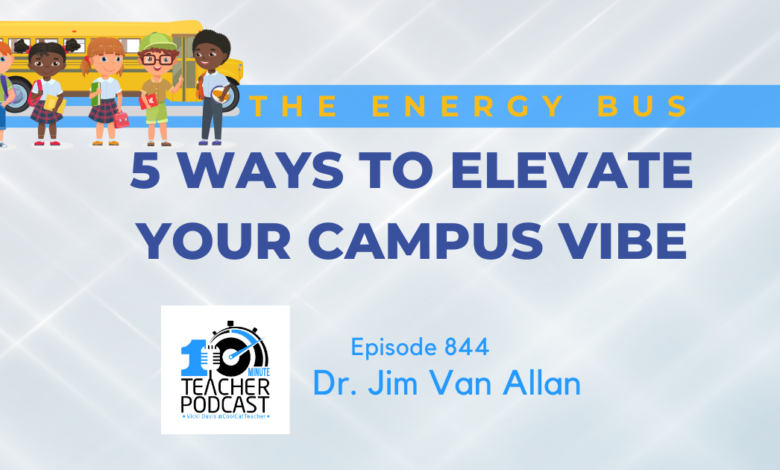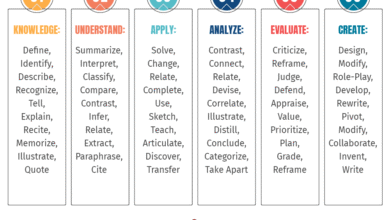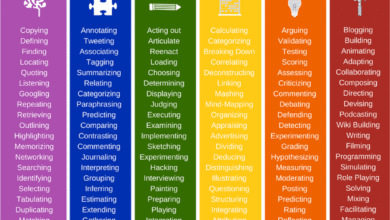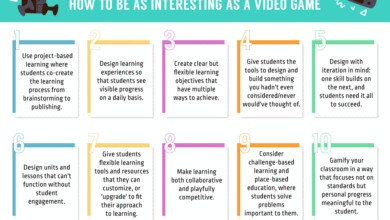5 Ways to Elevate Your Campus Vibe

Transcript generated in Riverside. Checked by me. Let me know about the errors.
Transcript
Vicki Davis (00:01)
I’m so excited today. We’re talking with a Dr. Jim Van Allan about five ideas we can use to improve campus culture. Now, as this is being released, Jim, you have a new book called The Energy Bus and you’re president of the Energy Bus for schools, but your expertise is improving the culture of a school. thanks for coming on the show.
Jim Van Allan (00:27)
Thank you, Vicki. Good to be here. I’m so excited about the Energy Bus for Schools
Vicki Davis (00:31)
So first of all, let’s define culture because there’s a lot of research on it showing the culture of your school is so important as well as the culture of your classroom.
Jim Van Allan (00:40)
Culture is definitely, it’s not one thing, right? It’s everything. That’s kind of the way I look at it. And culture is that vibe, that essence that you feel when you’re at a school. But it’s not just one thing somebody feels. It’s what everybody collectively believes about that school. And I’m talking about parents, students, faculty, anybody connected to that school. It’s what you feel about it. It’s what the vibe that it gets out. It’s the perception of it in the community. So culture is a, it can…
Vicki Davis (00:55)
Mm.
Jim Van Allan (01:10)
transform lives, right? Because it impacts everybody and everything inside of it, which of course is why it’s so important.
Vicki Davis (01:15)
Mm -hmm. Yeah. So what’s your first way to improve that campus culture? Because, you know, we have to understand that if it can be measured, it can be changed. And if some people are doing it well, you can learn from what they did and you can get similar results. Right. So we can improve our campus culture, can’t we?
Jim Van Allan (01:35)
Well, for sure. And it is measurable because you can look at attrition of faculty. You can look at test scores, attendance. You can look at behavioral issues, people moving to the area, for sure. So it’s definitely measurable. But I would say the first thing you need to do if you want to improve campus culture is you have to invite people on the bus, as we say with the energy bus. You have to invite people to be part of your vision for your culture.
If you’re a school leader and you have a culture that, a vision that you want to be one of the top performing schools in the area, or you want to be a highly connected school that transformed lives, you need to be able to communicate that effectively, not only to your staff, but to your students, to your community, and to the students. And you need to invite them to be part of that vision. And then you have to show them their role in executing that vision, right? Because anybody can set a vision, but it’s all about executing it.
So you gotta invite people on the bus first to set and share that vision. That’s number one, that’s most important.
Vicki Davis (02:30)
Mm -hmm.
So what does that look like for a principal or for teachers?
Jim Van Allan (02:43)
So principal and teachers, you have to be able to do it one on one. So if I’m a principal, I’m going to announce it maybe broad to a staff meeting. Okay. But then I’m going to go one on one. I’m going to be talking to my teachers and I’m going to be saying, how do you feel about this? What role do you think you can play? Maybe you’re going to do a book study. Maybe you’re going to bring in a speaker. Maybe you’re going to brand your school in that vision. You’re going to put up signs and posters. The principal is going to be, you know, announcing it on the announcement so the students can hear it. They’re going to be putting it in the newsletter and on their social media.
whatever their new vision and tagline or their core values, what they’re about, right? So that’s a powerful way of, you know, announcing it broadly in a big staff meeting, but then going to the one -on -ones and inviting people one -on -one to it and saying, this is what I think the school should be like, and here’s a role I think you can play. You know, when you invite somebody to be part of something, they’re more likely to say yes, because you’ve gone to them and you’ve said, I recognize a strength in you, and I think you can, I know you can help.
us execute this mission.
Vicki Davis (03:43)
Yeah. And I would guess you would work with a willing because you know, some people will volunteer and some will say, you keep asking me to do things.
Jim Van Allan (03:51)
But you’re not asking them to do a lot, right? You’re just asking them to believe in this vision, right? You’re asking them to believe in what this school can become. And then you’re asking them to have a positive attitude. You’re asking them to be looking for the good. You’re asking them to think positive. That’s really what it’s about. It’s not a committee. It’s not this whole giant thing when it comes to vision. It’s just asking them to be a part of this and believe in, not just buy into it, but believe it and live it.
Vicki Davis (04:18)
Wow. Okay. So what’s your second?
Jim Van Allan (04:21)
So second thing I’d say is once they’re on the bus, right, then you gotta fuel them. So I would say it’s fueling your ride with positive energy. You have to fuel people’s rides with positive energy. You have to love on them. You’ve invited them on the bus, right, now we gotta take care of them. And we should be looking, if I’m a school principal, right, I’m looking for specific ways that I can show love to my staff, okay? And that, hey.
I know your teachers love food. That could be food. It could be a jeans day. You know, it could be bringing in. I’ve had schools that they bring in massage therapists from the community and they do chair massages. They take the staff on fun excursions outside of the walls of the campus. I’ve seen the school once start a letter writing campaign where the teachers didn’t know it, but they had students, key faculty members had students write letters to their teachers.
And then they shared it with those teachers in an assembly. They would bring the student up and read that thank you letter to the teacher. They had no clue what this was gonna be about. How powerful is that, right? If I’m a teacher, you know, I’m gonna feel loved, so loved that way. And if you feed me too, I’m gonna feel extra love. But really it’s that heart love that they really want for sure.
Vicki Davis (05:13)
Hmm.
Wow.
Yeah.
Well, and that actually fits this morning in my personal growth time. I was reviewing John Maxwell’s how successful people lead and you know, he has different levels and he says, you know, a leader operates at all levels, but the first level is just position. You have a position. That doesn’t mean you’re a leader. You just have a position. But the second level is that people follow you because they want to. You have developed trust and they find out who the leader is.
And you find out who they are. And one thing that John Maxwell says to do is, okay, for the next two weeks, genuine compliment, not manipulative. You’re not asking for anything. You’re asking for nothing. You are only asking for people to know that you appreciate them and that they are valued. And he says, go and give a genuine compliment to each person each day for two weeks. Now that may sound like a lot. And if you have like 500 faculty, that might not be practical, but.
In our circle of influence, we can all genuinely appreciate each other. And doesn’t that factor into culture?
Jim Van Allan (06:39)
Oh, for sure. I mean, and you’re right, it has to be sincere, but you would be shocked at how many teachers actually don’t talk to each other during the day or during the year. So I’ve done an activity before where I’ve PD, I do in services a lot and we do an activity where I have to get them up and they have to talk to each other, okay, with question cards. And I preface it and I say, raise your hand if there are people on this campus who you’ve never spoken to once. And.
Vicki Davis (06:43)
Mm -hmm.
Yeah.
Hmm.
Wow.
Jim Van Allan (07:04)
I kid you not, every single time I do this, over half the hands in the room go up. Every single time. Could be a faculty of 100, it could be a faculty of 30. And I’m not saying you have to be buddy, buddy, let’s go rah rah, talk every single day, but half of the people are not talking to each other. How can you build a culture if people are not communicating? And if they’re not communicating, they’re not able to give those genuine, sincere compliments, that genuine, sincere love that myself, John Maxwell,
Vicki Davis (07:09)
Ugh.
Mm -hmm.
Wow.
Wow.
Yeah.
Jim Van Allan (07:31)
the guy I work with, John Gordon, talk about, right? We have to be able to communicate.
Vicki Davis (07:34)
Mm -hmm. That’s awesome. Okay, what’s our third?
Jim Van Allan (07:38)
Third one, I would say, and this one’s personal to me, it’s dynamic classrooms. So I come from a secondary system back home in Florida where we had teachers that it was project -based, team -based learning. And I can’t tell you, my creativity and my love for school exploded in those arenas. I just loved working with others and creating a business or pretending like we were running a country. And in doing those things, we learned all about.
finance and government and things that go along with those things, teamwork, the civic stuff we learned. So I took those ideas when I was in, and I’ve taught in higher ed for a number of years, public speaking, which everybody hates public speaking classes, right? But I made it, I flipped it. So every month I taught the course, we would do something like a people fair where they had to dress as a person and get up and speak and present like they’re that person. We would do debates.
Vicki Davis (08:22)
Mm -hmm.
Jim Van Allan (08:35)
We would bring the students to the county commissioner meetings and have them present about issues in their town or community to these commissioner meetings. And I turn these classes from horrible, poor attendance into one of the most people love coming to my classes because they felt like they were part of a team. They felt like they were part of a family, right? So no matter what your subject level is, you can find a way to bring in these team concepts where they become accountable to each other.
Vicki Davis (08:51)
Mm.
I love that. Yeah.
Jim Van Allan (09:04)
where they feel like if they’re not contributing, then they’re not contributing to the overall goal of that classroom. So when you build in those goals and this collaboration, you’re gonna find more engagement with your students. So dynamic collaborative classrooms.
Vicki Davis (09:17)
Absolutely. Project -based learning and the Buck Institute and lots of organizations have great information about excellent project -based learning, Okay, what’s fourth?
Jim Van Allan (09:27)
Fourth, we know as you build culture, right, you’re gonna try to do great classrooms and invite people on the bus and love them, but it’s still people. So what happens when you get groups of people together? Conflict, right? You’re inevitably going to have conflict. It’s just people have different agendas and just different things going on, different ways of thinking. So we always say, transform negativity. Don’t be afraid to have the difficult conversations, okay?
Vicki Davis (09:39)
It happens.
Jim Van Allan (09:56)
confrontation should lead to reconciliation. Okay, the more you sweep under the rug, meaning if I’m a principal, right, if I have a teacher that I need to talk with, first of all, identify is this an outlier behavior moment or is this a pattern? And if they’re outlier things, okay, you know, it’s nothing detrimental, nothing against the law, something happened, right? Okay, fine. If you’re seeing patterns of behavior,
Vicki Davis (10:01)
Yes.
right?
Yeah.
Jim Van Allan (10:23)
they’re late or they’re not turning stuff in or the attitude’s poor and it’s not just a bad day, it’s a repeated thing. We need to be able to take a walk, get outside of the offices, right, and work to transform that negativity because you know it’s going to negatively impact people around them. It only takes one person, right, to negatively impact people around them. And if I’m a colleague, if I’m a teacher, if I’m a principal, whomever, I’m not gonna be afraid to have those difficult conversations because…
Difficult conversations don’t have to be difficult at all. Just the way we look at it. And when you know that that end result is reconciliation and you’re coming from a place of love, then you’re building relationships right there.
Vicki Davis (11:09)
Well, in my 23 years, I think I’m up to like nine principals now. The ones that I’ve liked all of them, they’ve all been great people. But the ones that seem to have the most trouble with the faculty are the ones who don’t handle the individual issues in this sort of passive aggressive, mention the issue in the faculty meeting and everybody knows who they’re talking about. And everybody knows that they’re unwilling to address that issue with that person. And honestly,
Usually that person doesn’t have a clue or doesn’t care or whatever. And it just demotivates everyone because many of us teachers were rule followers. And so we always think you’re talking about us. We just do. Even if we know it’s not us, we get that downer type feeling and it does harm the culture of a school when this type of behavior happens. So it’s a gift to everyone.
when you handle specific issues privately with that person instead of doing the all call, call out one person that everybody knows you’re calling out. It’s just not a, that’s not productive or effective. And that’s just my words from being in a school, I guess. So we need to get to our fifth. What is it?
Jim Van Allan (12:32)
Fifth one, and this is where I want everybody to just kind of take a deep breath, right? Because we have to really enjoy the ride, okay? And I know we’re probably in one of the most challenging times for educators. You know, during COVID, post -COVID, there’s still sort of that, those aftershocks going on, but the work that we do, we’re seeing morale issues all over the place, you know, just leaders that are struggling. And still though, still.
Vicki Davis (12:40)
Mmm.
Jim Van Allan (13:01)
Those students come in the door every single day, no matter what’s going on. I have a first grader and a third grader, okay, in public schools. Like, they’re coming to school every single day. And teachers, you know, don’t get to hide. School leaders, don’t get to hide. You’re there front and center. And I just want you all to realize just how loved you are, how much support there really is out there for you from your parents, your community, your PTA, from –
for myself, we appreciate the work that you do. And I just want everybody to just take a deep breath and just try to think of the big picture, right? And how many students, you know, you have a classroom of 20, okay, those students are gonna go out and they’re gonna be students in the next grade. And then they’re gonna have families of their own and they’re gonna remember back their experience in your class and in your school, right? And they’re gonna be looking for schools and teachers for their own children later on.
that mirrored the experience they had when they were growing up. We all do that, right? Oh, back in my day, we did this or I had a teacher like this, or I went to a school like this, and they’re looking for that. So even though it’s one day, one day turns into what, 180 days, the impact is real, and you just have to think of your bigger purpose and the bigger picture, and hopefully that will help to fuel you through all the noise and negativity surrounding education and just…
Try to enjoy the moments, enjoy the ride, and look for the good every single day.
Vicki Davis (14:34)
I love that. Dr. Jim Van Allan, the book is The Energy Bus and thank you for these five awesome ideas to be able to improve our school culture. School culture is so important. We’re all part of it.
Thanks for the work you’re doing and thank you for coming on the show.
Jim Van Allan (14:51)
Thank you so much.



